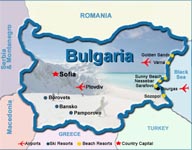Bulgarians vote - resentful over poverty and corruption
 Sofia - Bulgarians on Sunday go to their first parliamentary elections since joining the European Union amid resentment and disappointment over expectations which went unfulfilled after a long, hard transition.
Sofia - Bulgarians on Sunday go to their first parliamentary elections since joining the European Union amid resentment and disappointment over expectations which went unfulfilled after a long, hard transition.
Socialist Prime Minister Sergey Stanishev's grand coalition did manage to squeeze Bulgaria into the European Union in 2007, but the country remained plagued by widespread corruption and scandals.
Though ruling unchallenged since 2005 with the former prime minister Simeon II's National Movement and the Party for Rights and Freedoms of ethnic Turks, Stanishev failed to reform slow and corrupt courts and curb the powerful organized crime.
Blatant abuse of EU development funds by officials spurred Brussels into suspending or scrapping one billion dollars in aid planned for agriculture and infrastructure already in 2008.
The discontent has fuelled the popularity of a new party, Sofia Mayor Boyko Borisov's GERB, which already won the most votes a month ago in European Parliament elections, defeating the Socialists.
The financial also tripped Stanishev by effectively annulling the effects of four years of solid growth and slapping Bulgarians awake - they are now perfectly aware of how thin their reserves are in comparison to most other EU countries.
Borisov, himself a former top police official, has relentlessly been harping on the facts, promising the overdue showdown with the Mafia and a better image for Bulgaria among its European partners.
But despite all that working for it and its lead in popularity surveys, Borisov and GERB have yet to be tested in parliamentary polls and analysts predict inconclusive results, some even a stalemate and repeat elections as early as September.
Final pre-election surveys predicted that only five out of the 14 tickets would win at least 4 per cent of the votes to enter the race for the 240 legislative seats. GERB was predicted to win 27 per cent of the votes, the Socialists 18 per cent, all others far less.
Apart from GERB and the three ruling parties, the conservative Blue Coalition and the ultra-nationalist, anti-European and xenophobic Ataka party - which frequently embarasses mainstream Bulgarian officials - are also expected to pass the 4 per cent threshold.
Bulgaria, with 6.9 million registered voters, has become Europe's doorway to its southern neighbour Turkey and further on, to the Middle East when it joined EU 18 months ago. A staunch ally of the United States, Bulgaria joined NATO in 2004. (dpa)